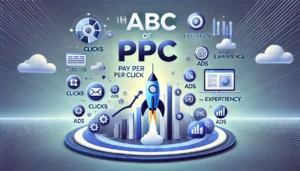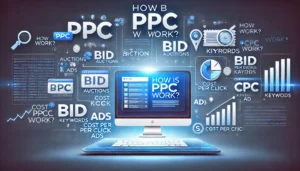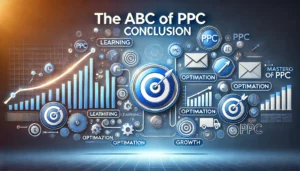The ABC of PPC: Pay Per Click for Beginners – Go From Zero to Hero

The ABC of PPC: Starting with Pay Per Click (PPC) advertising can feel like stepping into a new world.
At first, it might seem tricky, but with the right steps, anyone can master it.
This guide will help beginners just like you understand PPC and set you on the path to expertise 🚀
Key Takeaways for The ABC of PPC
- PPC advertising can seem hard at first, but it’s manageable with the right guidance.
- Understanding basic terms and how PPC works is crucial for success.
- Setting clear goals helps in creating effective PPC campaigns.
- Optimising ads can lead to better performance and more clicks.
- Regularly reviewing and adjusting your strategies based on metrics is key.
The Dawn of Your PPC Journey
Are you ready to transform your business and elevate your marketing game? Welcome to “The ABC of PPC: Pay Per Click for Beginners.” Here, you’ll learn how PPC can be the key to unlocking your business’s full potential. As you embark on this journey, you’ll discover how PPC advertising can expand your reach, drive targeted traffic, and ultimately boost your success.
Whether you’re starting from scratch or looking to refine your existing strategies, this blog is your guide to mastering PPC and turning clicks into customers. Let’s dive in and turn your marketing efforts from zero to hero!
Understanding the Basics of PPC (The ABC of PPC)
What is PPC?
Pay-Per-Click (PPC) is a type of online advertising where we pay a fee each time someone clicks on our ad. It’s a way to buy visits to our site, rather than earning them organically. PPC can be a powerful tool for driving traffic and generating leads quickly. We often use it to target specific audiences and get immediate results.
How Does PPC Work?
PPC works through an auction system. When someone searches for a keyword, an auction takes place to determine which ads will appear. We bid on keywords relevant to our business, and if our bid is among the highest, our ad will show up. The cost per click (CPC) depends on the competition for that keyword. It’s essential to manage our bids carefully to avoid overspending.
Key Terminologies in PPC
Understanding PPC requires knowing some key terms:
- CPC (Cost Per Click): The amount we pay each time someone clicks on our ad.
- CTR (Click-Through Rate): The percentage of people who click on our ad after seeing it.
- Quality Score: A metric that Google uses to determine the relevance and quality of our ads and keywords.
- Ad Rank: Determines the position of our ad on the search results page. It’s calculated based on our bid amount and Quality Score.
Mastering these basics is crucial for running successful PPC campaigns. By understanding how PPC works and familiarising ourselves with key terms, we can make informed decisions and optimise our advertising efforts effectively.
The ABC of PPC: Creating Your First PPC Campaign
Embarking on your first PPC campaign can be both exciting and a bit overwhelming. The key to success lies in a careful, strategic approach that matches your unique goals and resources. This isn’t just about getting clicks; it’s about turning those clicks into meaningful customer interactions that boost your brand and bottom line.
Choosing the Right Platform
Selecting the right platform is crucial. Whether it’s Google Ads, Bing Ads, or social media platforms, each has its own strengths. We need to consider where our target audience spends their time online. For instance, Google Ads might be ideal for broad reach, while social media platforms could be better for targeted demographics.
Setting Up Your Campaign
Setting up a PPC campaign involves several steps. First, we need to create an account on our chosen platform. Next, we should organise our account structure, including campaigns, ad groups, and keywords. This helps in managing and optimising our ads effectively. A well-structured account is easier to manage and yields better results.
Budgeting and Bidding Strategies
Budgeting and bidding are critical components of any PPC campaign. We must decide how much we’re willing to spend daily and set our bids accordingly. There are different bidding strategies, such as cost-per-click (CPC) and cost-per-thousand-impressions (CPM). It’s essential to choose a strategy that aligns with our campaign goals. Effective budgeting ensures we get the most out of our investment without overspending.
Remember, the goal is not just to attract clicks but to convert those clicks into valuable customer engagements. This is where the real power of PPC lies.
Optimising Your Ads for Maximum Impact
Crafting Compelling Ad Copy: The ABC of PPC
Creating ad copy that grabs attention is crucial. We need to focus on the headline and the call to action. Bold and clear headlines help increase relevancy. Update your ad text regularly, say once a month, to see what fetches a better click-through rate and conversion rate. Do A/B testing. While testing, change one thing at a time. For example, change the headline alone or change only the call to action so that you know what change helped make a difference.
Utilising Ad Extensions
Ad extensions can make our ads more appealing and informative. They provide extra information and can increase our ad’s visibility. Use site link extensions to direct users to specific pages on your website. Callout extensions can highlight unique offers or features. Structured snippet extensions can show additional details about our products or services. These extensions can improve our ad’s performance and help us stand out from the competition.
A/B Testing Your Ads
A/B testing is essential for finding out what works best. We should test different versions of our ads to see which one performs better. Change one element at a time, like the headline or the call to action, to understand what makes a difference. Track the results and use the data to improve our ads. This ongoing process helps us create more effective ads and achieve better results.
Optimising our ads is an ongoing process. We need to keep testing and updating to stay ahead of the competition.
By focusing on these strategies, we can make our ads more effective and achieve better results. Whether we’re working with Google ads agencies or doing a Google ads audit, these tips will help us get the most out of our PPC campaigns.
Making Sense of PPC Metrics
Understanding PPC metrics is crucial for any successful campaign. These numbers aren’t just figures; they tell a story about our performance and guide our next steps. Let’s break down the key aspects of PPC metrics to make them more digestible.
Advanced PPC Strategies
In the world of PPC, advanced strategies can make a significant difference in your campaign’s success. Let’s dive into some of these techniques.
Remarketing Techniques
Remarketing is a powerful tool that allows us to target users who have previously interacted with our website. By showing tailored ads to these users, we can increase the chances of conversion. This strategy is particularly effective for e-commerce businesses looking to re-engage potential customers.
Geotargeting and Local PPC
Geotargeting enables us to focus our ads on specific geographic locations. This is especially useful for businesses that operate in particular areas or have physical stores. By targeting local audiences, we can ensure our ads are relevant and more likely to drive traffic. For instance, a London PPC agency can use geotargeting to attract local clients.
Leveraging AI and Automation
AI and automation are revolutionising PPC management. These technologies help us optimise bids, identify the best keywords, and even create ad copy. By leveraging AI, we can make data-driven decisions that enhance our campaign performance. Automation tools also save time, allowing us to focus on strategy and creativity.
Embracing advanced PPC strategies can transform your campaigns from basic traffic generators to sophisticated engines driving growth. Remember, the digital landscape is always changing, so continuous adaptation is key.
By incorporating these advanced techniques, we can elevate our PPC efforts and achieve better results. Whether it’s through remarketing, geotargeting, or AI, the goal is to maximise our return on investment and stay ahead of the competition.
Expanding Your PPC Efforts
As we start to see success, it’s time to think bigger. Expanding our PPC efforts means more than just spending more money. It’s about making smart choices to get the most out of every dollar. Let’s look at some ways to do this.
The ABC of PPC: Scaling Your Campaigns
First, we need to think about scaling our campaigns. This means reaching out to new groups of people. At first, we might have focused on a small group to keep costs low. Now, we can look at broader groups or new places. For example, if our product is popular with young professionals in cities, we might try to reach suburban parents or people in rural areas.
Exploring New Platforms
Next, we should explore new platforms. We might have started with Google AdWords PPC, but there are other options out there. Each platform has its own strengths. Trying out new ones can help us find new customers and boost our ecommerce business in 2025 and beyond with an expert PPC marketing agency.
International PPC Campaigns (The ABC of PPC)
Finally, let’s think about going global. Running international PPC campaigns can open up a whole new world of customers. We need to consider different languages, cultures, and buying habits. This can be a big step, but it can also bring big rewards.
Expanding our PPC efforts is a big step, but it’s worth it. With careful planning and smart choices, we can reach new heights and achieve our goals.
Real-Life PPC Success Stories
Case Study: Small Business Growth
In our first case study, we explore how a small business leveraged PPC to achieve remarkable growth. Initially, the business faced numerous challenges, including limited brand awareness and a tight budget. By focusing on interest-based marketing and utilising Facebook’s Advantage+ Shopping Campaigns, they managed to reach a broader audience. The results were astounding: a 150% increase in website traffic and a 200% boost in sales within just three months.
Case Study: E-commerce Triumph
Next, we delve into the success story of an e-commerce store that specialises in unique, handmade products. They turned to a PPC company specialising in e-commerce, Amazon Ads, SEM, and marketing services. By optimising their product feeds and employing interruption-based marketing, they saw a significant uptick in conversions. Their return on ad spend (ROAS) improved by 300%, proving the effectiveness of a well-executed PPC strategy.
Lessons Learned from Failures
The ABC of PPC: Not all PPC campaigns are successful from the get-go. In this section, we discuss some common pitfalls and how to avoid them. One business, for example, overlooked the importance of negative keywords and ended up wasting a significant portion of its budget. Another ignored mobile users, missing out on a large segment of potential customers. By learning from these mistakes, we can better navigate the complexities of PPC and achieve our marketing goals.
Staying Ahead in the PPC Game
Keeping Up with Industry Trends
In the fast-paced world of PPC, staying updated with the latest trends is crucial. We need to keep an eye on new features and updates from major platforms like Google Ads and Facebook Ads. Being proactive in learning about these changes can give us a competitive edge. Subscribing to industry blogs and joining relevant forums can help us stay informed.
Continuous Learning and Adaptation
The digital landscape is always evolving, and so should our strategies. We must invest time in continuous learning through online courses, webinars, and workshops. This not only enhances our skills but also helps us adapt to new tools and techniques. Remember, adaptability is key to long-term success in PPC.
Networking with PPC Professionals
The ABC of PPC: Building a network of PPC professionals can provide us with valuable insights and support. Attending industry conferences and participating in online communities can help us connect with experts. Sharing experiences and learning from others can significantly improve our campaigns.
By embracing these strategies, we can transform our PPC efforts from basic traffic generators to sophisticated engines driving growth. Remember, staying ahead requires constant attention and adaptation to the ever-changing digital landscape.
Common Mistakes to Avoid in PPC
Overlooking Negative Keywords (The ABC of PPC)
One of the most common mistakes we see in PPC campaigns is overlooking negative keywords. Negative keywords help us filter out irrelevant traffic, ensuring our ads are shown to the right audience. Without them, we risk wasting our budget on clicks that don’t convert. It’s crucial to regularly update and review our negative keyword list to maintain the effectiveness of our campaigns.
Ignoring Mobile Users
In today’s digital age, ignoring mobile users can be a costly mistake. With more people using their smartphones to browse and shop online, our PPC campaigns must be optimised for mobile devices. This includes having mobile-friendly landing pages and ads that look great on smaller screens. Failing to do so can result in a significant loss of potential customers.
Failing to Track Conversions
Tracking conversions is essential for measuring the success of our PPC campaigns. Without proper tracking, we can’t determine which ads are performing well and which ones need improvement. Setting up conversion tracking allows us to see the full picture and make data-driven decisions. Don’t underestimate the power of accurate tracking; it can make or break our PPC efforts.
One common mistake in PPC is not targeting the right audience. This can lead to wasted budget and poor results. To avoid this, make sure to research and understand your audience well. If you need help with your PPC campaigns, visit our website for a free pay per click audit. Our experts are ready to assist you in optimising your ads for better performance.
The ABC of PPC Conclusion
In wrapping up, it’s clear that mastering PPC is a journey worth taking. From understanding the basics to optimising your ads, each step is crucial. Remember, every click is a chance to grow your business. By applying what you’ve learned, you can turn those clicks into customers and see real results. Keep experimenting, stay updated with trends, and never stop learning. With dedication and the right strategies, you’ll go from zero to hero in no time.
Frequently Asked Questions for The ABC of PPC
What is PPC?
PPC stands for Pay Per Click. It’s a type of online advertising where you pay a fee each time someone clicks on your ad.
How does PPC work?
PPC works by placing ads on search engines or other websites. You bid on keywords, and when someone searches for those terms, your ad might show up. You pay only if someone clicks on your ad.
Why should I use PPC for my business?
PPC can quickly drive traffic to your website. It’s great for getting immediate results and can be very effective if done right.
What are keywords in PPC?
Keywords are the terms or phrases that you bid on in PPC campaigns. They are what people type into search engines when looking for information.
How do I choose the right platform for my PPC campaign?
Consider where your audience spends time online. Google Ads is a popular choice, but platforms like Facebook and Bing can also be effective depending on your target audience.
The ABC of PPC: What is a good budget to start with in PPC?
It depends on your goals and industry. Starting with a small budget and gradually increasing it as you see results is often a good approach.
How can I track the success of my PPC campaign?
You can track success using metrics like click-through rate (CTR), conversion rate, and return on ad spend (ROAS). These will help you understand how well your campaign is performing.
The ABC of PPC: What are negative keywords?
Negative keywords are terms you don’t want your ads to show up for. Adding these to your campaign can help improve its efficiency by filtering out irrelevant traffic.
Author
Search Blog
Free PPC Audit
Subscribe to our Newsletter
The Voices of Our Success: Your Words, Our Pride
Don't just take our word for it. With over 100+ five-star reviews, we let our work-and our satisfied clients-speak for us.
"We have been working with PPC Geeks for around 6 months and have found Mark and the team to be very impressive. Having worked with a few companies in this and similar sectors, I rate PPC Geeks as the strongest I have come across. They have taken time to understand our business, our market and competitors and supported us to devise a strategy to generate business. I value the expertise Mark and his team provide and trust them to make the best recommendations for the long-term."
~ Just Go, Alasdair Anderson




